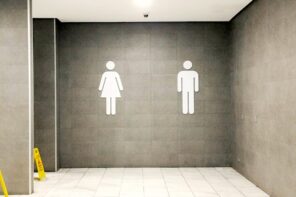In the latest important, if entirely unsurprising, news we learned this week that white evangelicals are more opposed to transgender rights than any other demographic in the United States. The data is found in a new report by the Public Religion Research Institute, “Most Americans Generally Support Pro-LGBTQ Policies, But Are More Divided Over Specifics Like Transgender Sports and Bathroom Policies,” that contains some encouraging data about overall acceptance of queer people in addition to some discouraging news about attitudes that affect trans people in particular.
The good news is that a full 82% of Americans say they “favor laws that protect LGBTQ people from discrimination in jobs, public accommodations, and housing.” Protections of this nature, which were not previously guaranteed at the federal level (and thus lacking in many states), were upheld by the Supreme Court last year in its Bostock decision. Nonreligious Americans lead the pack on this measure, with a full 91% saying they support these basic nondiscrimination protections for queer people.
White evangelicals come in last, although a solid majority of 66% of that demographic claim to support these protections. Unfortunately, going ahead, LGBTQ nondiscrimination will almost certainly be seriously undermined by the Roberts Court’s expansive acceptance of religious exemptions for conservative Christians—exemptions that white evangelicals, Mormons, and traditionalist Catholics in particular tend to lobby for.
With respect to religious exemptions, the report notes that most Americans (63%) “oppose allowing small business owners to refuse service to LGBTQ people if doing so violates their religious beliefs.” By contrast, per PRRI:
“white evangelical Protestants remain the only major religious group in which a majority favors religiously based service refusals, and their support for these exemptions is increasing. A majority of white evangelical Protestants (62%) say that they support allowing small business owners to refuse to serve LGBTQ people, up from 54% in 2019 and 51% in 2015.”
While the overall prospects look good for queer equality, at least with respect to public opinion, the news for trans people is not as good. Since 2018, support for trans equality in key areas such as bathroom access and school sports participation has actually decreased across a range of demographics, though much more sharply on the Right than on the Left. For example, 73% of Democrats supported allowing transgender girls to participate in high school athletics on teams with cisgender girls. That figure has now dropped to 62%. Among Republicans, however, support dropped from 30% to 9%. Support among Americans generally is at 36%, down from 50% in 2018. Support for trans boys competing on teams with cis boys is at 46% today, down from 61% in 2018.
Here, too, religious (non)affiliation is a highly significant factor. As the report notes:
The same trend occurs across all religious groups, with white evangelical Protestants least supportive of either male (26%) or female (8%) transgender students participating in high school athletic events with cisgender students who share their gender identity. By contrast, members of other non-Christian religions (68% male transgender vs. 51% female transgender), Hispanic Catholics (64% male transgender vs. 57% female transgender), and religiously unaffiliated Americans (60% male transgender vs. 52% female transgender) are the only religious groups in which majorities support the participation of both male and female transgender students in high school sports.
With respect to bathroom access in accordance with a trans person’s gender identity, 47% of Americans overall are supportive and 50% are opposed, figures relatively unchanged in the last few years but that are up in comparison with data from 2016. The pattern noted above also holds here. 72% of white evangelicals oppose equal bathroom access for trans individuals, compared to 28% of nonreligious Americans, a figure that has essentially held steady since 2016.
In a year that has been marked by some truly draconian anti-trans initiatives, such as Arkansas’s law banning gender-affirming healthcare for trans minors and a raft of bills barring trans schoolchildren from participation in sports on teams that match their gender identity, it seems self-evident that discrimination against trans individuals has increased significantly in the past twelve months. Unfortunately, only 39% of Americans agree that this is the case according to PRRI, while 12% say discrimination has decreased, and 46% perceive the level of discrimination as unchanged.
Again, there are massive gaps in the findings for particular partisan and (non)religious demographics. 59% of Democrats say discrimination has increased, for example, vs. 19% of Republicans. Meanwhile, only 22% of white evangelicals say discrimination against trans people has increased over the last year, compared to 46% of the nonreligious population, 54% of Hispanic Catholics, and 56% of Black Protestants.
RD reached out to Robert P. Jones, the CEO and founder of PRRI and the author of White Too Long: The Legacy of White Supremacy in American Christianity, for comments on the significance of, and reasons for, these trends. Asked what might be driving increased opposition to trans access to bathrooms and school sports, Jones observed, “It’s hard to know,” although he pointed to the “dozens and dozens of [anti-trans] bills being introduced” as a likely factor, noting that anti-trans politics “has become kind of a talking point or rallying cry.” In his view, this has transformed trans rights from “a practical issue at the local level” into an element of Americans’ “partisan, tribal identity.”
Jones also pointed to the influence of right-wing media, both Fox News and the media to its right, such as Newsmax and One America News Network, as a significant factor on the Right. “Even if we look among Republicans, we can see the difference between those who trust mainstream news and those who trust Fox or outlets to the right of them.” What the right-wing media ecosystem does is push fear-based narratives, representing members of othered groups—immigrants, Black Lives Matter supporters, trans people—as threats. Thus, Jones observes, even if “the bigger war for LGBTQ rights is clearly won,” trans people remain particularly marginalized and vulnerable, which means that for those pushing an authoritarian, fear-based politics, they’re “an easier target.”
In this connection, Jones also emphasized the report’s findings on how knowing a trans person makes a significant difference in support for trans rights. And here, there’s some encouraging news. In 2011, when PRRI first asked questions about trans rights, only one in ten Americans claimed to know any transgender individuals. That figure has doubled over the last decade to one in five Americans.
It seems, then, that trans visibility is helping the trans community secure our rights over time, though it has simultaneously made it easier for trans folks to be targeted in the right-wing backlash against LGBTQ rights. Asked why white evangelicals in particular are so overwhelmingly against trans rights, Jones replied, “Anti-gay attitudes have been with the Christian Right from the beginning, so this is old and in the political DNA of that movement.” Indeed, the more the Christian Right became a cohesive movement over the last half century or so, the more opposition to LGBTQ rights became “a political identity marker” for white evangelicals.
Today, trans people are the primary targets for their anti-queer moral panic, but certainly not the only target. “That whole evangelical worldview is built on a set of hierarchies,” Jones said. “And something like the fluidity of gender, the fluidity of sexuality, blows up that binary of men over women.” Most Americans have moved past this authoritarian gender politics. Can white evangelicals do the same? As an exvangelical, I don’t think they can, based on my lived experience as well as academic study. Time will tell if I’m right or wrong.





